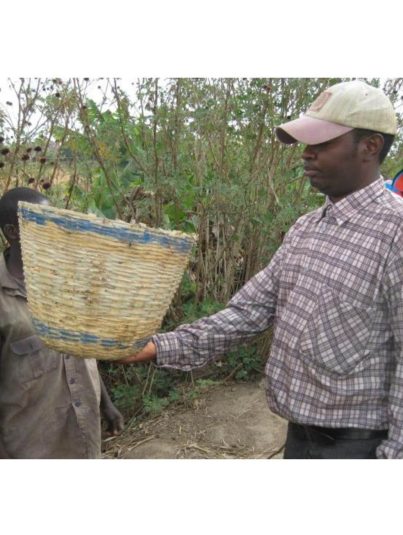Rawalo Youth Development Foundation is a non-governmental organization founded in 2011 with the long-term objective to contribute to food security of rural households in Siaya County.
Budget Breakdown (approx)
We can connect you with the project owner if you would like to fund this project directly
Problem Statement
Agricultural production and productivity for Gem in Siaya is low. Low productivity can be attributed to natural and man-made reasons. Natural factors include erratic and inconsistent rain in nature that leads to drought and famine. Man-made factors are poor soil fertility, traditional farming systems, lack of improved agricultural inputs, over-cultivation of the land and the like. Land shortage is a common and serious problem in Gem. This has led to over cultivation of the land that in turn causes soil erosion and poor soil fertility. All of these problems have resulted in low productivity and food insecurity of the area.
Farmers in Gem usually produce more or less similar crops. When these crops unfortunately fail to give enough yield food shortage occurs.
Diversification of agricultural production is important because there can be many sources of both income and product. Fruit and vegetable production is one way in which agriculture can be diversified and it is one component of crop production that can contribute to food security of the area. Fruit production is experienced is many parts of Gem nowadays. How-ever, the system of production is backward and as a result, no enough yield is obtained from it. Besides, there are no enough sources of fruit and vegetable seeds for farmers. The available fruits are those, which do not induce more income for the farmers.
In rural areas farmers plant many trees near to their farmlands that no longer give fruits. However, if the fruit trees substitute these trees more income can be obtained as currently there is high need for fruit and vegetable in the market is high. On the other hand, fruits and vegetable have high nutritional value. If these are planted and grown by the farmer, households could be able to get balanced diet that contributes to good health of the society. Therefore, production of these has double importance, namely; for income generation and nutritional value.
Rawalo Youth Development foundation is currently planning to undertake a project that
focuses on production of fruits and vegetable that generates more income for farmers.




Project Details
Goal
The overall goal is to enhance the adaptive capacity of selected wards in Gem to climate change and strengthen farmers’ capacity to meaningfully engage in climate smart agriculture.
Project Objective
This proposal seeks to support small farmers by increasing their resilience to climate change and other environmental shocks. The proposed action will introduce innovations on farms aimed at enhancing the resilience of small producers and demonstrate to other farmers, simple adaptation technologies which can improve the productivity of their enterprises and reduce their vulnerability to environmental risks. This includes the implementation and adoption of climate resilient technologies and crop diversification practices. These systems will be established in Central, North, West, Yala Township and South Gem wards in Gem Constituency in Siaya County . These are areas of intensive farming, which have all experienced severe climatic impacts over the last six years. Expected outputs are 2400 individuals produced fruits and vegetables and their income increased.
Project activities
The project will undertake the below activities:
- The establishment of five model plots with commissioned rainwater harvesting systems with drip-line technology for field conveyance;
- The procurement and cultivation of appropriate cultivars of vegetable seeds for production of vegetables and fruits on the model plots;
- Execution of soil conversation and land farming measures as needed which will include, among other measures bench terraces, contour drains, grass barriers, runoff drains etc; and
- Training and education for twenty core and satellite farmers in: (1) vegetable production, (2) climate change and farming systems adaptation to climate change, (3) management of small scale irrigation systems and (4) agribusiness development.
Project Supplies
Conversion of surface irrigation system to drip and other water saving techniques: Supplies, technical specialists for the conversion of irrigation to drip. This will cover 1 ha at each site, with a total of 10 ha.
Supply of Farm Implements: The farm implements will be purchased that will be dedicated to the project.
Supply of farm Inputs: This is to facilitate the initial up-scaling and thrust for production of quality high value crops. The inputs will be carefully selected from the market end for both field crops and vegetable crops to be used in the pilot. The inputs will include: legumes, sweet potato cuttings, fertilisers, vegetable seed/seedlings and purchase of Climate Smart Implements.
Supply with harvesting material: The right type of harvesting and handling material and
supplies will be provided to the farmers involved in vegetable farming so that there is minimal
damage and value for money in produce moved to the market.
Market Linkages
Marketing and market linkages are an integral part of the project and as such these will be established at the beginning of project implementation. Rawalo Youth Development Foundation staff has been tasked with the responsibility of marketing farmers’ produce under this project.
Rehabilitation of cold chain facilities (satellite): These are located within 30km radius of all
the targeted schemes, an existing packhouse will be revamped and a cold room installed to ensure immediate refrigeration of harvested produce to prolong shelf life.
Purchase of refrigerated truck (5mt): A truck will be purchased for specific use by these
schemes, and where possible other schemes very close to the project. The truck will transport
fresh produce from the fields to the satellite cold storage facility and subsequently to the main
centre in Yala town. This is to ensure that the cold chain is started within 5 hours after
harvesting and is not broken up to the end user.
Running of cold chain facilities: The cold chain facilities will be manned by staff employed by RYDF, including the set up and maintenance of amenities such as water and electricity.
This is to ensure top quality handling and that farmers’ produce is well graded for good returns
on investment.
PROJECT METHODOLOGY
Involvement of the community
The community is the nearest partner to the project than anyone else. Therefore, the community will involve in selection of the beneficiaries, monitoring the progress of beneficiaries and evaluating the impact of the project.
Collaboration of government offices
As government offices are one of the stakeholders in the project they shall participate to a large extent in overall project cycle for successful completion of the project..
Sticking to government policies
This project is in line with the food security strategy, agriculture led- industrialization and sustainable development and poverty reduction program of Kenya
.
Efficient and effective use of resources
The disbursed resources will be used to the point for stipulated purpose so that the project will meet the stipulated goal.
Target group profile
Poorest and food insecure households are the major target of this project. These will be selected by Rawalo Youth Development Foundation, local representatives and community members. These groups of beneficiaries (the poor) are the highly vulnerable ones to food insecurity and they should be major beneficiaries of this project. They shall be provided with seeds of vegetables and fruits and tools to cultivate these.
Organization and management
Different stakeholders will involve in organization and management of this project. Rawalo Youth Development Foundation (RYDF) has the responsibility of handling the project through its organizational structure. RYDF shall plan, implement, monitor and evaluate the project in collaboration with other government offices and community. The collaborating offices are rural development and finance and economic development. These two offices have the responsibility of providing technical support, monitoring the progress and finally evaluating the project. The community shall involve from planning to evaluation of the project. Donating agencies have responsibility of monitoring the progress and receiving the report. RYDF shall also report the progress on monthly, quarterly and annual basis to concerned offices.
Sustainability and phase out strategy:
First this Project involves the participation of different stakeholders especially the community and government offices. These will handle and monitor the project even after the phasing out of the project. Second, the project beneficiaries


Comments